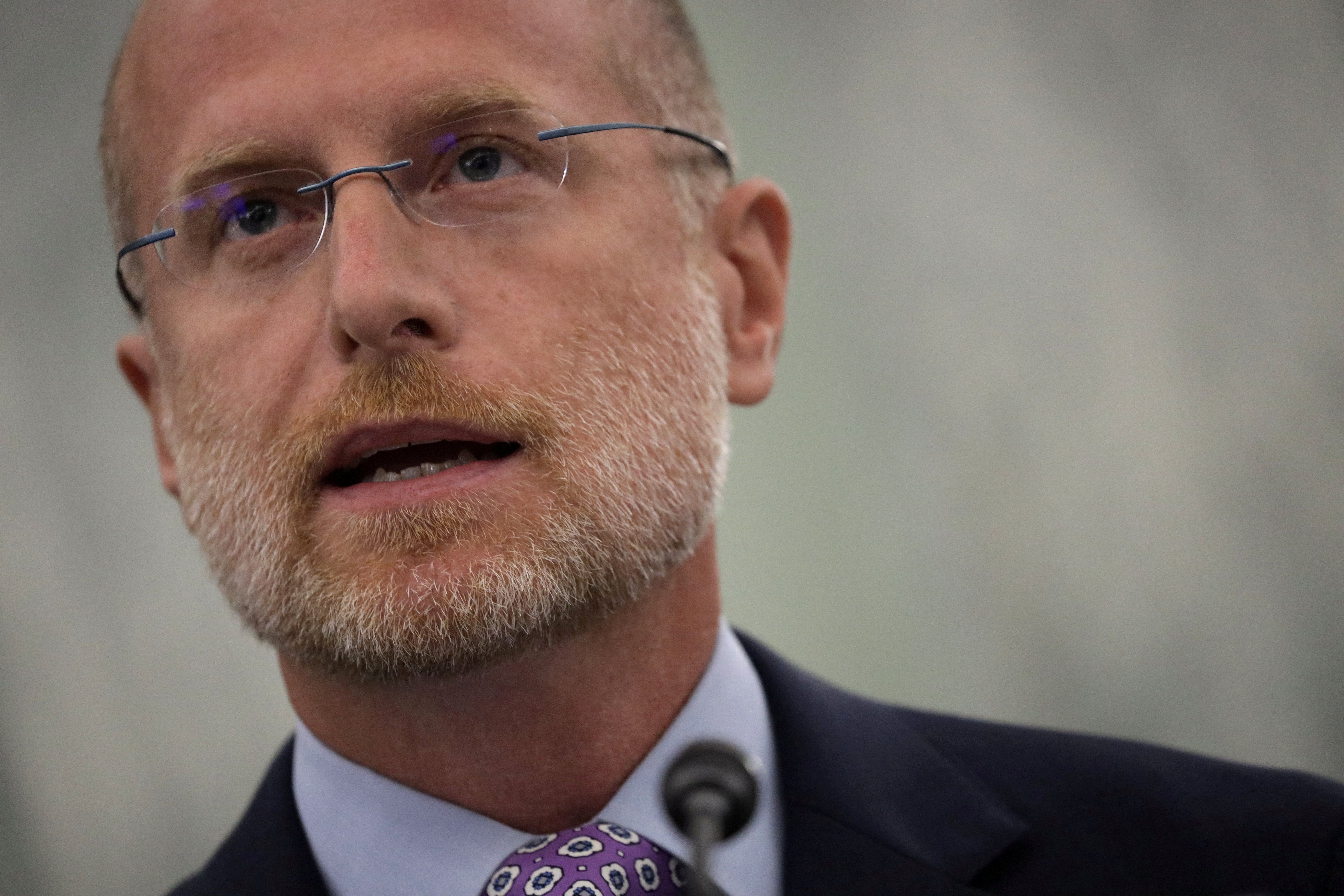Commissioner of Federal Communications Commission Brendan Carr testifies during an oversight hearing held by the U.S. Senate Commerce, Science, and Transportation Committee to examine the Federal Communications Commission (FCC), in Washington, U.S. June 24, 2020. Alex Wong/Pool via REUTERS/File Photo
Two powerful groups of media executives very friendly to President Donald Trump are currently embroiled in a fight that puts FCC chair Brendan Carr in an awkward position, reports Politico's John Hendel.
"The nation’s largest TV station owners want Carr’s Federal Communications Commission to loosen the rules that limit how many stations a single company can operate, a goal that many conservatives have been pressing for years," Hendel writes.
These owners, however, have a "formidable opponent in Trump confidant Chris Ruddy, the majority owner of Newsmax Media, who wants to keep the rules in place and now appears to be making headway with the president," he explains.
Trump took to Truth Social Sunday to demonstrate that headway, Hendel notes.
"NO EXPANSION OF THE FAKE NEWS NETWORKS,” Trump wrote, "echoing Ruddy’s argument that removing the ownership cap would hurt conservatives," Hendel explains.
“If anything, make them SMALLER!” Trump added.
Carr, Hendel writes, "has shown a knack for disruptive, MAGA-pleasing culture-war moves, like his public upbraiding of comedian Jimmy Kimmel and accusing '60 Minutes' of being unfriendly to conservatives," but now he's conflicted.
"Carr has signaled he may want to change the 21-year-old limit on TV station ownership, which was intended to prevent any one broadcaster from too much power over what Americans see on television," Hendel explains. "Loosening the ownership rule would allow right-leaning companies like Sinclair Broadcast Group to expand."
Large TV station owners are hitting a growth limit, Hendel writes, so "a larger cap would give more power to station owners — seen by many conservatives as an ideological counterweight to the mainstream national networks that control TV programming."
Newsmax's Ruddy, however, is standing in the way, Hendel says.
"Ruddy is trying to block any change, arguing that the cap — which limits a broadcaster’s reach to 39 percent of U.S. households — preserves the right market balance between TV broadcasters and cable outlets, and allows a greater mix of voices," he writes.
“It’s not going to work,” Ruddy tells Politico. "The president doesn’t want this, and so I have no doubt that he will not support the FCC going to extraordinary but potentially illegal lengths.”
Joining Ruddy is Charles Herring, president of the pro-Trump One America News Network (OANN) cable channel, who, Hendel writes, "shares a marketplace wariness of TV station owners gobbling up too much power."
“Independent [and] diverse voices will disappear,” wrote Herring in an X post.
Under Trump, this has turned "into a political tug-of-war and an influence battle between big names on the right," Hendel says.
Former Trump press secretary Sean Spicer recently wrote an op-ed in right-wing outlet The Daily Caller in which he argued that Carr should lift the cap.
“Conservatives who believe in free enterprise should not be vocally encouraging Big Brother to continue barring broadcast TV companies like Sinclair and Nexstar from competing in the free market,” argued Spicer, a contributor to Nexstar’s cable network NewsNation.
Nexstar, Hendel notes, is "trying to usher through a $6.2 billion deal to buy rival station owner Tegna, a merger that would only be possible if Carr relaxes the cap. The new company would operate 265 TV stations, reaching more than half the country."
Ruddy, however, says "that the FCC is working to go against the interests of the president and his supporters — and really against most consumers.”
“We have a history of big companies going in and giving conservative think tanks money to do reports and stand on issues,” Ruddy adds “And it’s not working.”
Through all this, Trump "is being pulled in both directions on an issue he cares a great deal about: what’s on television," he writes.
“If this would also allow the Radical Left Networks to ‘enlarge,’ I would not be happy,” Trump wrote.
"That will likely give broadcasters and their conservative allies room to try to counter Ruddy’s narrative — and some are already casting the issue accordingly," Hendel explains.
On Monday, Nexstar said that "Americans want more access to local news and a variety of voices without the filter of the coastal elites."
For now, the person truly stuck in the middle is Carr.
"Carr’s path to lifting the cap is uncertain, and his own staff say they’re likely to end up in court over the issue. Detractors don’t even believe the agency has the authority to unleash this consolidation at all, saying it’s a matter for Congress," Hendel says.
"We haven’t made a final decision there yet,” Carr told Politico on Nov. 18. “I continue to be very open minded.”
From Your Site Articles
- FCC chairman assigns 'bias monitor' to CBS — who reports 'directly to the president' ›
- 'Misleading the American public': Trump’s FCC chair tweets veiled threat at media giant ›
- Trump FCC chair’s 'threats' are brutally at odds with Supreme Court precedent: legal expert ›
Related Articles Around the Web
